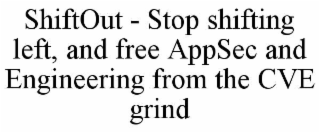Trademark Overview
On Thursday, November 6, 2025, a trademark application was filed for SHIFTOUT - STOP SHIFTING LEFT, AND FREE APPSEC AND ENGINEERING FROM THE CVE GRIND with the United States Patent and Trademark Office. The USPTO has given the SHIFTOUT - STOP SHIFTING LEFT, AND FREE APPSEC AND ENGINEERING FROM THE CVE GRIND trademark a serial number of 99482496. The federal status of this trademark filing is NEW APPLICATION - RECORD INITIALIZED NOT ASSIGNED TO EXAMINER as of Thursday, November 6, 2025. This trademark is owned by Root.io Inc.. The SHIFTOUT - STOP SHIFTING LEFT, AND FREE APPSEC AND ENGINEERING FROM THE CVE GRIND trademark is filed in the Computer & Software Products & Electrical & Scientific Products and Computer & Software Services & Scientific Services categories with the following description:
Software as a service (SAAS) services featuring software for agentic vulnerability remediation for containerized applications and software supply chains; Providing temporary use of on-line non-downloadable software for performing automated vulnerability analysis, patching, and risk reduction using intelligent, policy-driven workflows; Providing temporary use of on-line non-downloadable software for orchestrating agentic remediation actions across container registries, build systems, and runtime environments; Providing online non-downloadable computer software platforms for secure, autonomous vulnerability remediation within DevOps and CI/CD ecosystems
Downloadable software for agentic vulnerability remediation in containerized applications and software artifacts; Downloadable software for identifying, analyzing, and remediating security vulnerabilities using automated and policy-driven workflows; Downloadable software for applying patches and updates to open source and proprietary components within container images; Downloadable software for integrating agentic remediation into DevOps pipelines and cloud-native environments; Downloadable open-source computer software for reducing software supply chain risk and attack surface in containerized environments
